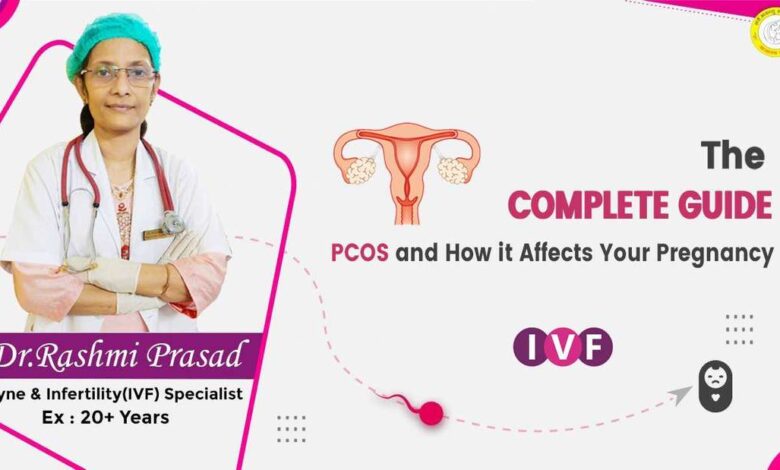The Complete Guide to PCOS and How it Affects Your Pregnancy

If any female has PCOS (polycystic ovary syndrome) and wants to get pregnant, you may think it is possible to conceive with PCOS naturally. This question is tricky because there are many variables and few guarantees. Also, many factors can influence the chances of pregnancy, including age and the general health of your partner.
This article will give you a comprehensive guide on what happens when you have PCOS and want to conceive.
What is PCOS?
PCOS is an endocrine disorder, and more than 10 million women suffer worldwide. However, it is a hormonal and metabolic disease. When the women are not able to complete is monthly ovulation process, the PCOS problem occurs. The woman suffering from PCOS has less than 8 mensuration cycles in a year. In the PCOs problem, the cysts shown on the ovaries’ outer lining are immature eggs and ejected from the body. Hence they are stuck on the ovary walls.
This entire problem will lead to a hormonal imbalance problem in the body and increase androgen levels. Presently PCOS is the leading cause of infertility, and it is linked to symptoms that affect both mental and physical health. The symptoms are:
1. Unwanted hair growth
2. Fatigue
3. Weight gain
4. Pelvic pain and sleep problems
5. Mood swings and many others.
Moreover, according to a recent survey in 2022, less than 60% of urban women are aware of the PCOS problem. However no permanent cure for PCOS, but you can manage the symptoms with an early diagnosis.
Causes of PCOS
However, no exact cause of PCOS has been discovered, but it is said that it may occur due to genetics. Many women who have PCOS have insulin resistance. It means the body can’t use insulin well. The usual symptoms of PCOS are:
1. Production of a higher testosterone level in the body results in facial hair.
2. Insulin is not well used in the body, and due to higher insulin levels can lead to weight gain and infertility problems.
How is PCOS Diagnosed?
Before any test, the doctor will ask about your medical history and symptoms. After that, the test will also include a physical exam and a pelvic test; a doctor can analyze the health of reproductive organs both from the inside and outside of the body.
The tests are:
1. Blood Test: Through this test, the doctor can check androgens and other hormone levels in the body and insulin levels. Also, this test gives you a report about cholesterol and triglyceride levels.
2. Pelvic examination: The doctor may conduct a physical examination so that the doctor can feel any abnormal growth in the pelvic area. It includes abnormalities in the ovaries, vagina, rectum, cervix, fallopian tubes, and clitoris.
3. Ultrasound: This test uses sound waves and a computer that creates images of blood vessels, organs, and tissues. Through this test, the size of the ovaries and cysts can be checked, and the uterus lining thickness.
What is the Infertility Rate with PCOS?
Getting pregnant with PCOS and infertility is high. Usually, PCOS women have difficulty getting pregnant and require treatment to improve pregnancy chances. Some women who have PCOS will ovulate occasionally, and others do not ever ovulate. While conceiving, sperm must find and fertilize a mature egg.
Can I Conceive With PCOS?
The probability of getting pregnant with PCOS is reasonable, and the women can get a baby by adopting fertility treatment. If you are below the age of 35, ovulate regularly, and don’t have any other problems with your partner, the pregnancy can occur within one year. Mostly in females, after the age of 35, the chances of pregnancy start declining, but on the other hand, it happens that women naturally conceive at the age of 40s.
How to Increase the Probability of Pregnancy?
It is best for all women before getting pregnant is having a healthy body, and ultimately it will increase pregnancy and provides the baby with the best start in life. According to international evidence guidelines for assessing and managing PCOS, if a woman adopts a healthy lifestyle, including a nutritious diet, regular exercise, avoiding smoking and alcohol, and getting enough sleep, this will increase a baby’s chances.
Those women who have PCOs and plan to have them are recommended to consult with a doctor who will guide them the best and prepare a plan of action in case of PCOS difficulties. At the time of ovulation and having sex will increase the chances of pregnancy or conception.
Risk of PCOS to Mother and Baby
Possibly PCOS symptoms can affect both mother and baby. Also, the other problems include:
1. Preeclampsia: Due to Preeclampsia, there is a sudden increase in blood pressure and swelling of the hands or face. Generally, this happens in early pregnancy or after 20 weeks, but it can be treated.
2. Miscarriage: A woman who has PCOS has the chance of early miscarriage in the pregnancy, but research shows that taking medications may reduce the risk.
3. Mood Swings: Due to PCOS, other problems can also be incurred like depression, anxiety, and also higher level of androgen hormones binge eating.
4. Gestational Diabetes: Gestational Diabetes only appears during pregnancy. It is a condition in which hormones from the placenta block the body’s production of the hormone insulin, resulting in high blood sugar levels.
5. Premature Birth: It is the probability that in PCOS, the child is born prematurely.
How is PCOS Treated?
The treatment plan may depend on age, severe symptoms, and overall health. The type of treatment also decides whether you want to get pregnant in the future or not. If you are planning to get pregnant, then Consult IVF Specialist Doctor in Patna and it may include:
1. Change in diet and activity: A healthy diet and regular exercise help reduce weight and other symptoms. It also allows the body to use insulin efficiently; ovulation occurs on time and lowers blood glucose levels.
2. Medication to cause Ovulation: With medicines, it helps the ovaries to release eggs typically. But due to medications, it leads to other risks and the chance of having twins.
Ways to get pregnant with PCOS?
Naturally, it is difficult to get pregnant with PCOS, but the best approach is to have sex frequently. The women with PCOS do not ovulate on time, and the timing of sex in the middle of the cycle – people, often use day 14 as default may not work. If you have longer cycles, you may be ovulating closer today, 20 – 22, which means that if you, default to day 14; you are a whole week off from your optimum conception time. In contrast, if you have a short cycle, you may ovulate early in 9 to 10, making sex in day 14 too late. However, the earlier you get treatment with PCOS, the better your chance of getting pregnant.
Conclusion
If you have PCOS, you may still expect to conceive within a year (or less) so long as you’re generally ovulating and have no different risk factors for infertility. If you do, it can take longer or require the input of a fertility specialist. The excellent methods to boost the odds of regular ovulation—and, in turn, your chances of conceiving—are to make healthy choices. This includes quitting cigarettes, exercising regularly, losing extra weight, reducing lower back on alcohol, and getting plenty of rest.
It additionally allows tracking your fertile window by monitoring your basal body temperature, checking for changes to your cervical mucus, and using an ovulation predictor kit.
FAQs
Best age to get pregnant with PCOS
How to get pregnant with PCOS quickly
Lifestyle changes: Weight management, regular exercise, and a balanced diet can improve ovulation and overall health.
Medication: Your doctor might prescribe fertility drugs to regulate ovulation.
Assisted reproductive technology (ART): Options like in-vitro fertilization (IVF) can be effective for some women with PCOS.
What precautions to take during pregnancy with PCOS
Regular check-ups: Consistent monitoring of blood sugar, blood pressure, and baby’s growth is crucial.
Healthy lifestyle: Maintain a balanced diet, exercise regularly, and get adequate rest.
Medication management: Discuss any medications you’re taking with your doctor.
Risk awareness: Be aware of potential complications like gestational diabetes, preeclampsia, and miscarriage.
PCOS and first trimester pregnancy symptoms
Missed period
Breast tenderness
Fatigue
Nausea (morning sickness)
Frequent urination
However, some women with PCOS might experience irregular bleeding or spotting, which can be concerning. It’s essential to consult your doctor for any unusual symptoms.




